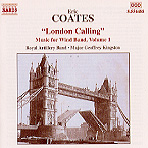Calling all wind band enthusiasts! Here is a program that’s guaranteed to enhance your collection and enliven your listening. And if you’re not a wind band enthusiast, perhaps you haven’t yet encountered the music of Eric Coates, whose reputation as Britain’s “finest and most successful light-music composer” is well-deserved. An accomplished orchestral violist–he served as principal in the Queen’s Hall Orchestra from 1913-19–something compelled him to give his playing career over to writing marches and other patriotic works, as well as songs and occasional pieces for orchestra. Something in his music–the lively, optimistic, hummable tunes, the welcoming spirit of the orchestrations that tapped a long tradition of British national music–drew in the masses who found it an easy and welcome source of communal inspiration, especially during the dark days of World War II.
If Elgar’s light music recalls imperial Britain, Coates’ personally addresses the wartime foot soldier and factory worker, the common individual reminded of his or her crucial importance to the effort. These sentiments are embodied in marches such as The Eighth Army March, Over to You (dedicated to aircraft workers and fliers), Salute the Soldier, Calling All Workers, and, Coates’ most popular and enduring creation, the Dam Busters March, written for the WW II film The Dam Busters (a must-see for all war movie buffs). In a different, but less successful vein, his three-movement suite, The Three Elizabeths, seeks to capture something of Britain remembered (“Halcyon Days” and “Spring Time in Angus”) and gives a confident hail to a hopeful future with a rousing final march, “Youth of Britain”. Of Coates’ post-war music, the march Rhodesia is one of his best. It was virtually forgotten, however, after that country declared independence from Britain in 1965.
Major Geoffrey Kingston and his Royal Artillery Band certainly have the right feel for these pieces, fully exploiting the warm, reedy timbres of saxophone and clarinet and the rich, vibrant tone of horns, cornets, and trombones. A strong but never over-indulgent percussion section gives the music just the right pulse and impetus. This is a generous–70-plus minutes–and satisfying program that fills a few critical gaps in a modest Coates discography. [12/30/1999]
































